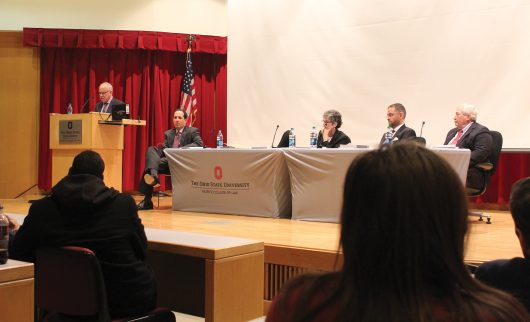
A panel consisting of Ohio State University Moritz College of Law professors moderated by Alan Michaels, dean of Moritz College of Law, met to discuss President Donald Trump’s executive orders on immigration in the Moritz College of Law Saxbe Auditorium on February 6. Credit: Mitch Hooper | Engagement Editor
A panel discussion about the legal aspects of President Donald Trump’s recent executive orders on immigration was held in the Ohio State’s Moritz College of Law on Monday.
The panel consisted of law professors Ruth Colker, David S. Bloomfield, Mohamed Helal and Peter M. Shane, and was moderated by Alan Michaels, the school’s dean. Students, faculty and OSU staff members, as well as Columbus community members, were in attendance and were encouraged to join the conversation.
By examining the legality of the new executive orders, panelists provided information for both sides of the argument, saying that the ban violates the rights of an individual, but also saying it’s unclear whether the orders violate international law. Since the panel focused on explaining the law, Shane said he wanted to make it clear that “legal and illegal are not synonyms for good and bad.”
Colker, who studies constitutional law and disability discrimination, and Shane, who studies administrative law with a specialty in the separation of powers, began the discussion explaining what is spelled out in the two new executive orders, as well as why they view it as unconstitutional.
Shane said the order Enhancing Public Safety in the Interior of the United States, which addresses illegal immigration, might face “more legal hurdles based on issues of constitutional power.” Citing Section 9 of the order, a section stating that state law officials must comply with the laws of communication between government agencies and the Immigration and Customs Enforcement, under 8 U.S.C 1373, Shane said it was created to make law enforcement agencies to follow immigration detainers.
By ensuring that local law enforcements obey immigration detainers, Shane said, local law enforcement agencies can keep an arrested immigrant beyond their release date. This allows for more time for federal agencies to make a decision on whether to take the individual into federal custody for deportation.
“The problem with Section 1737 is it’s probably unconstitutional,” Shane said. “The Supreme Court held in 1997 that Congress may not make it a legal duty of state and local law enforcement officials to enforce federal law. This has become known as the ‘Anti-Commandeering Principle.’”
Colker, on the other hand, spoke about the other immigration executive order, titled Border Security and Immigration Enforcement Improvements, which has has been referred to by detractors as a Muslim ban. Colker argued that details of the order, such as allowing immigration from Israel, a non-Muslim Middle-Eastern country, “furthers the claim that this order was made to disadvantage Muslims.”
The order, parts of which are currently being held up in court, temporarily banned immigration for most citizens of seven Muslim-majority countries in the Middle East and Africa, indefinitely banned the entry of Syrian refugees into the U.S. and suspended the U.S. refugee-intake program as a whole for 120 days.
Helal, who specializes in public international law, said the new orders might experience some struggles within the court systems in the U.S., but the wording of these orders, such as immigrant screenings, do not violate international law. Referring to foreigners living abroad in the United States, he said international human-rights laws do not apply as they only apply to individuals physically living in the country or under law of that country.
“International human-rights laws, which is the applicable body of law, simply does not protect foreigners living outside of the United States,” Helal said. “In other words, it’s perfectly within the law for the United States to purposefully discriminate other people on the basis of their religion, origin, nationality or what have you.”


